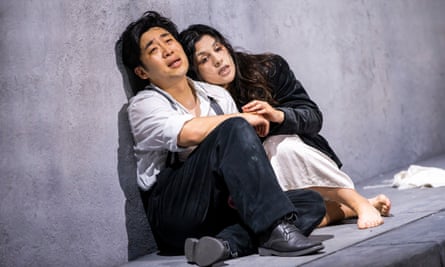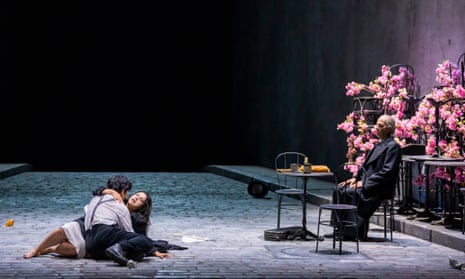‘We’ll part when the flowers appear,” sing Mimì and Rodolfo at the end of act three, putting off the break-up they have now accepted as inevitable. There’s nothing in Puccini’s music to dampen the audience’s fond hope that they’ll work things out in the meantime and live happily ever after. But in Floris Visser’s new La Bohème, there is a chill to these words – because the flowers are already appearing, sickly pink against the monochrome set, uncovered by the tall, gaunt figure who has been shadowing consumptive Mimì since before she stepped into Rodolfo’s life.
Death is not in Puccini’s cast list. But in Visser’s production, which plays on any number of film references from The Seventh Seal to Meet Joe Black, he is on stage so much that it’s almost a surprise that he doesn’t get the final curtain call. Can the others see him? Mimì can, once she accepts her illness; Rodolfo can’t, yet he glances over his shoulder as if he senses something is there. The opera becomes something other than – arguably more than – a story of youth and doomed love. And Visser’s gamble pays off: it is riveting.

It helps that Christopher Lemmings is such a magnificently magnetic presence, silent except for when he assumes the brief role of Parpignol, the toy-seller whose half-dozen notes usually go almost unnoticed; here he is doling out red balloons that you suspect might have strings infused with cholera. Those balloons are a rare spot of colour against the black and grey of Jon Morrell’s costumes and Dieuweke Van Reij’s set, a blank-walled street stretching back into dark nothingness.
Against this, the life-affirming vibrancy of Puccini’s music strikes one more directly than ever, even if Visser missteps occasionally – making Rodolfo fiddle with a recalcitrant typewriter during a soaring phrase of his aria, for example. Yaritza Véliz sings Mimì with a white-gold, charged soprano. Sehoon Moon’s incisive tenor suits blase Rodolfo (Long Long, who should have been singing but fell victim to the visa delays that are plaguing UK classical music at the moment, takes over from the third performance). And Vuvu Mpofu is an irresistibly stylish Musetta.
Jordan de Souza conducts the London Philharmonic, and it’s as if all the colour that has been leached from the stage is brimming over the edge of the pit. It’s not only love that is defiant in the face of death, but music, too.
In rep at Glyndebourne festival until 14 August.

Comments (…)
Sign in or create your Guardian account to join the discussion